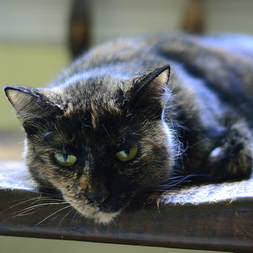
Are you surprised when you return home to find that your cat has urinated on your sofa or shredded your favorite shirt? Are you receiving complaints from your neighbors that she yowls or mewls all day? Although an underlying medical condition may be responsible for some of these behaviors, the most likely culprit is separation anxiety.
While many cat owners don’t associate cats with separation anxiety, a recent study by researchers at Oregon State University and Monmouth University found that when cats were given a choice between food, human companionship, scent and toys, half of them chose human companionship and only 37 percent chose food.
Orphaned kittens or those weaned too early from their mothers are the ones most prone to developing separation anxiety. A divorce, the death of an owner or some other abrupt change in the household and the familiar rhythm of its regular routine may also trigger separation anxiety, particularly in senior cats.
Cats with separation anxiety may express apprehension over their owners’ unexplained absence (ranging from a medical emergency to a vacation with advance care arrangements made) in highly destructive and/or annoying ways. Some of these “acting out” behaviors include scratching the furniture, pacing, crying, fighting with the other cats, refusing to eat and compulsively grooming themselves -- licking or chewing at their fur until they create large bald patches. While others sulk or become depressed, some begin urinating and/or defecating outside their litter boxes or spraying urine on their owners’ bed and/or clothing.
The reason for spraying is simple: spreading her scent around may actually help an anxious cat feel more secure. Mixing her odor with that of her cherished and absent owner is a way to feel closer to her owner.
If yours is an anxious and clingy kitty, don’t despair, there are ways to reduce her anxiety and improve her quality of life. The first step is to visit your vet to rule out any underlying health conditions that may be causing the problem. If your vet concludes that your cat does indeed have separation anxiety, consider the following ways to make her more comfortable and less fearful when you’re away from home.
Enrich her environment. Food puzzles and other interactive toys can engage your cat’s brain and help take her mind off the fact that you’re not there. Having the food released from a puzzle toy will both challenge her intelligence and keep her constructively occupied.
To reduce the risk of her growing bored, rotate her favorite interactive toys, bringing out the best ones only when you’re ready to leave.
Screen a nature DVD featuring a variety of birds, squirrels, and fish. Their quick movements and high-pitched noises should keep your cat intrigued and entertained for hours. Alternatively, set up a window perch with a view of a bird feeder outside or a wall perch with a view of an appropriately secure aquarium inside that she can watch but not access.
Plug in a diffuser that emits feline pheromones. They mimic the natural pheromones produced by a mother cat and appear to have a soothing effect on some anxious cats.
Because cats so dislike change, set up and stick to – as much as possible -- a fixed schedule of feeding and playing with yours at the same times each day to help relieve some of her stress.
In severe cases of separation anxiety, however, consider consulting a veterinary behaviorist whose trained observations may give new insight into your cat’s behavior. And, when necessary, your vet can prescribe an anti-anxiety medication to help her stay calm in your absence.









 RSS Feed
RSS Feed